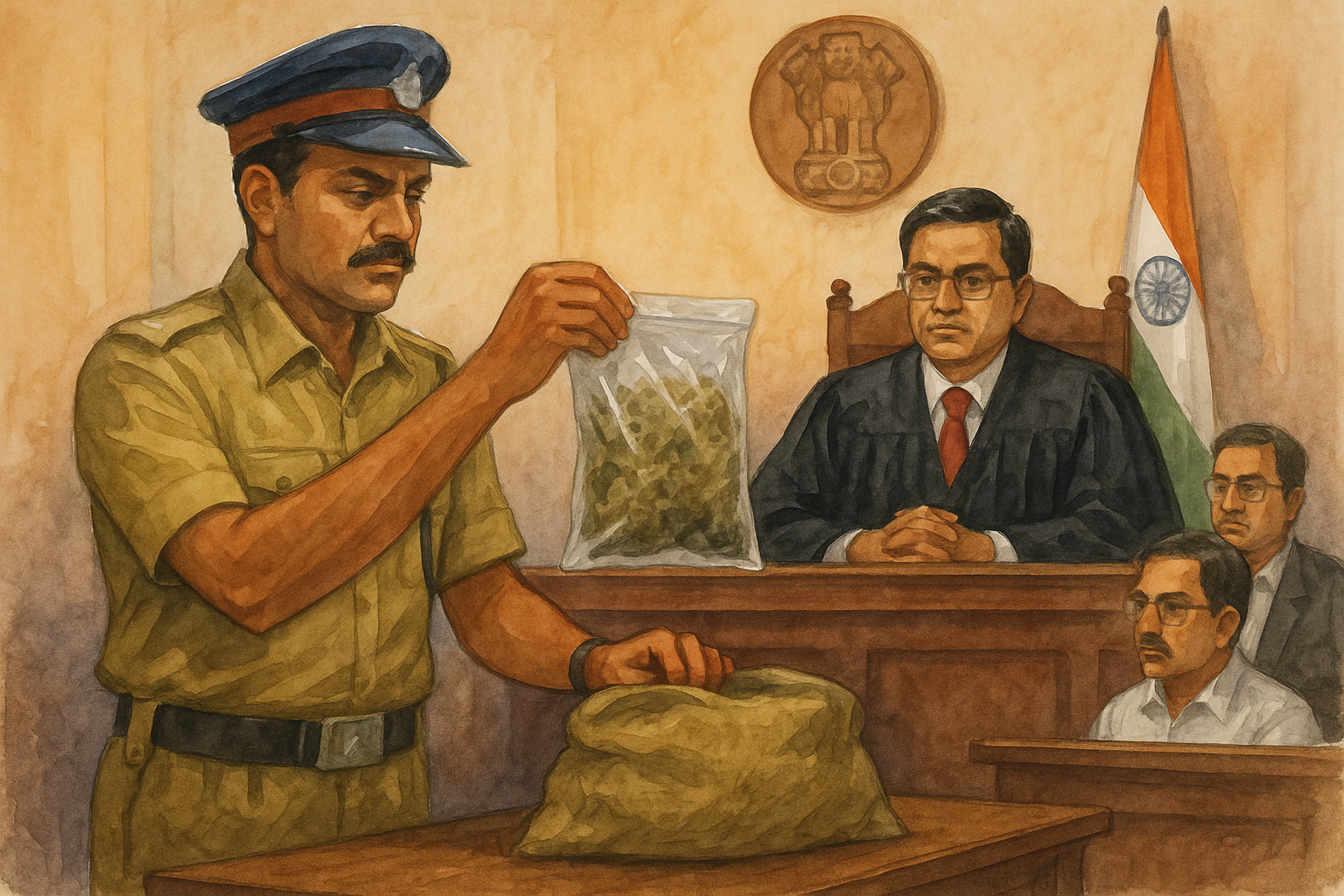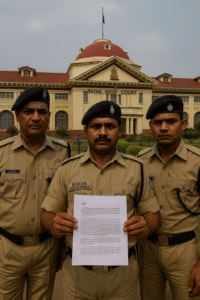The Patna High Court set aside the conviction of a defendant under the Narcotic Drugs and Psychotropic Substances Act, 1985 (NDPS Act), holding that total non-compliance with Section 42 and serious evidentiary lapses vitiated the prosecution. The appeal was allowed and the accused was ordered to be released. The case arose from an alleged seizure of approximately 41.8 kilograms of ganja from a residential house in Buxar district, Bihar. The trial court had awarded ten years’ rigorous imprisonment and a fine, but the High Court found that mandatory safeguards and basic evidentiary requirements were not met.
The incident stemmed from a “confidential information” received by the police about alleged storage of ganja for commercial purposes. The police recorded a “sanha entry,” informed senior officers, formed a team, and moved to the location. The record shows that the house was searched in the presence of a Block Development Officer acting as a Magistrate, and two bags containing ganja were said to be recovered. Samples were drawn and a forensic report later confirmed the presence of tetrahydrocannabinol. However, the High Court emphasized that the prosecution must demonstrate strict or substantial compliance with Section 42 of the NDPS Act—i.e., reducing prior information into writing and forwarding it to the immediate superior officer—especially when the search is in a building. The Court found no proof of such compliance on record.
The appellant’s counsel argued that Section 42(1) and 42(2) were not complied with at all. The defense also highlighted contradictions among prosecution witnesses about who was present in the house, how many rooms were searched, what color cloth was used for sealing, and who retrieved the seized bags. Independent seizure witnesses did not support the prosecution version; they asserted their signatures were obtained on blank papers at a marketplace. The forensic scientist said only one sealed sample was received, whereas the police claimed three samples were prepared after mixing small quantities from the two bags—an impermissible practice that breaks the evidentiary link.
The State argued that a huge quantity was seized, signatures existed on the seizure list, and the community’s health and safety concerns should not be overlooked for “minor technical flaws.” However, the Court reiterated that fair trial under Article 21 includes fair investigation, and the prosecution carries the burden to prove compliance with statutory safeguards and the integrity of the seizure, sealing, and sampling process. On cumulative assessment, the High Court concluded that the prosecution failed to establish guilt beyond reasonable doubt.
Ultimately, the High Court set aside the conviction and sentence, holding that total non-compliance with Section 42 is impermissible, the testimony of independent witnesses undermined the seizure, the chain of custody was poorly established (no Malkhana register produced and no in-charge examined), and the condition of the sealed bags admitted in court showed opportunities for tampering. The appeal succeeded and the accused was directed to be released forthwith.
Significance or Implication of the Judgment (For general public or government)
This decision is a strong reminder that the NDPS Act’s stringent punishments come with equally stringent procedural safeguards. For the public, it underscores that while narcotics offences are serious, the law requires strict adherence to procedures designed to prevent misuse of power and wrongful convictions. Total non-compliance with Section 42—failing to reduce prior information into writing and communicate it to a superior—can unravel an entire case, even when the alleged quantity is “commercial.”
For the police and government agencies, the judgment is a cautionary note: ensure documentary proof of Section 42 compliance, maintain a clean chain of custody, and record every step—from search authorization to seizure, sealing, deposit in the Malkhana, and dispatch of samples. Independent witnesses must be reliable; their statements cannot be backfilled or contradicted by officers. The forensic sampling protocol must be scrupulously followed: never mix samples from different packets, and send duly sealed and accounted-for samples with an intact link evidence trail. Deficiencies in any of these areas risk acquittal despite serious allegations.
Legal Issue(s) Decided and the Court’s Decision with reasoning
- Whether Section 42 of the NDPS Act was complied with.
Decision: No. The Court found “total non-compliance” with Section 42(1) and (2). There was no credible proof that the prior information was reduced into writing and forwarded to a superior officer. As per the Constitution Bench in Karnail Singh, total non-compliance is impermissible and fatal to the prosecution. - Whether the seizure and search were proved through trustworthy evidence.
Decision: No. Independent witnesses did not support the search and seizure; they stated their signatures were taken on blank papers elsewhere. Because they were not declared hostile, their testimony could be used by the defense and was binding against the prosecution, as explained by the Supreme Court in Raja Ram and Mukhtiar Ahmed Ansari. - Whether there was a reliable chain of custody and sealing.
Decision: No. The record lacked the Malkhana register or testimony of the Malkhana in-charge; the sealing details were inconsistent (even the cloth color differed in witness accounts), and the sealed bags produced in court were in a condition from which items could be inserted or removed, creating room for tampering. - Whether sampling was conducted as per best practices to connect seized contraband to the accused.
Decision: No. The officers mixed small quantities from two different bags and then made three samples, but only one sample reached the forensic lab, breaking the essential link evidence. The prosecution also failed to establish that the house was identified as exclusively belonging to the accused, further weakening possession and knowledge.
Judgments Referred by Parties (with citations)
- Karnail Singh v. State of Haryana, (2009) 8 SCC 539 — cited by the defense to argue that total non-compliance with Section 42 is fatal, while delayed compliance may be condoned only with satisfactory explanation.
Judgments Relied Upon or Cited by Court (with citations)
- Karnail Singh v. State of Haryana, (2009) 8 SCC 539 — Constitution Bench; total non-compliance with Section 42 is impermissible.
- Raja Ram v. State of Rajasthan, (2005) 5 SCC 272 — testimony of a witness not declared hostile can be relied upon by the defense and binds the prosecution.
- Mukhtiar Ahmed Ansari v. State (NCT of Delhi), (2005) 5 SCC 258 — principle reiterated regarding reliance on witnesses not declared hostile.
Case Title
Criminal Appeal (SJ) No. 2487 of 2017 — [Appellant] v. State of Bihar. (Official case title as per judgment; names avoided in this article.)
Case Number
Criminal Appeal (SJ) No. 2487 of 2017; arising out of Brahampur (Chakki O.P.) P.S. Case No. 336 of 2015; NDPS Case No. 8 of 2015 (Buxar).
Citation(s)
2021(2) PLJR 546
Coram and Names of Judges
Hon’ble Mr. Justice Birendra Kumar. Judgment dated 25-03-2021 (CAV).
Names of Advocates and who they appeared for
- Mr. Vikramdeo Singh, Advocate — for the appellant (with Mr. Shankar Kumar, Advocate).
- Mr. Zeyaul Hoda, APP — for the State.
Link to Judgment
MjQjMjQ4NyMyMDE3IzEjTg==-GYAkIQckgdU=
If you found this explanation helpful and wish to stay informed about how legal developments may affect your rights in Bihar, you may consider following Samvida Law Associates for more updates.








